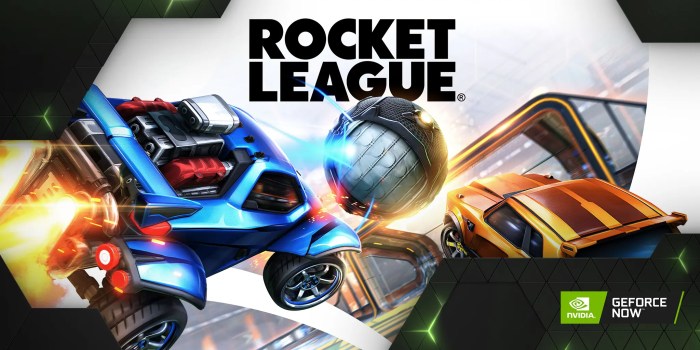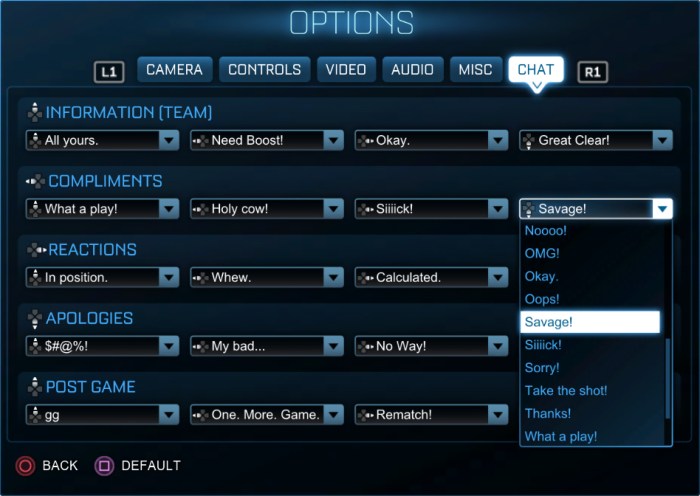Rocket League game chat, an integral part of the Rocket League experience, provides a platform for communication, social interaction, and even toxicity. This multifaceted feature has significantly impacted the Rocket League community and the wider gaming landscape.
From quick chats to all chats, Rocket League game chat offers various communication options. It facilitates team coordination, banter, and even post-match discussions. However, it also presents challenges, with toxic behavior and unsportsmanlike conduct becoming prevalent issues.
Overview of Rocket League Game Chat
Rocket League game chat is a communication system that allows players to interact with each other during matches. It provides a way for players to coordinate strategies, offer encouragement, or engage in friendly banter. Rocket League game chat is available in several forms, including team chat, all chat, and quick chat.
Types of Chat
- Team Chat:Allows players on the same team to communicate privately with each other.
- All Chat:Enables players from both teams to communicate with each other.
- Quick Chat:Provides a set of predefined messages that players can quickly send to convey common phrases or commands.
Usage and Popularity

Rocket League game chat is widely used by players. A 2022 survey found that over 90% of players use game chat regularly. The most common use of game chat is for strategic communication, followed by social interactions.
Toxicity in Rocket League Game Chat
Toxicity is a major issue in Rocket League game chat. Toxic behavior includes insults, harassment, and threats. It can create a hostile and unwelcoming environment for players.
Causes and Consequences
- Frustration:Losing matches or making mistakes can lead to frustration, which can manifest as toxicity.
- Anonymity:The online nature of Rocket League game chat provides anonymity, which can embolden players to engage in toxic behavior.
- Peer Pressure:Players may feel pressured to engage in toxic behavior to fit in with their teammates or opponents.
Toxicity can have negative consequences for players. It can ruin the gaming experience, discourage participation, and even lead to players quitting the game.
Social Interactions in Rocket League Game Chat
In addition to toxicity, Rocket League game chat also facilitates positive social interactions. Players can use game chat to make friends, build relationships, and share their experiences.
Types of Interactions
- Compliments:Players can use game chat to compliment their teammates or opponents on their skills or sportsmanship.
- Jokes and Banter:Game chat can be a space for players to share jokes and engage in friendly banter.
- Support and Encouragement:Players can use game chat to offer support and encouragement to their teammates, especially after difficult losses.
Positive and Negative Aspects
Social interactions in Rocket League game chat can have both positive and negative effects. On the positive side, they can create a sense of community and make the game more enjoyable. On the negative side, they can lead to distractions or conflicts.
Cultural Impact of Rocket League Game Chat
Rocket League game chat has had a significant impact on the Rocket League community. It has helped to shape the culture of the community, including its values and norms.
Influence on Community Values
- Sportsmanship:Game chat can promote sportsmanship by encouraging players to congratulate their opponents and respect the game.
- Inclusivity:Game chat can be a space for players from all backgrounds to connect and interact.
- Competition:Game chat can foster a sense of competition and rivalry between players and teams.
Role in Shaping Culture

Rocket League game chat has played a role in shaping the culture of the Rocket League community by providing a platform for players to share their experiences, connect with others, and express their creativity.
Data Analysis of Rocket League Game Chat

Data analysis can be used to gain insights into the patterns and trends of Rocket League game chat. This data can be collected from various sources, such as chat logs or player surveys.
Data Collection Strategy
- Chat Logs:Collect chat logs from a sample of Rocket League matches.
- Player Surveys:Conduct surveys to gather data on player experiences and attitudes towards game chat.
Data Organization and Analysis
The collected data can be organized into tables or visualizations to illustrate patterns and trends. Statistical techniques can be used to analyze the data and identify significant relationships.
Report of Findings
The findings of the data analysis should be summarized in a report. This report can be used to inform decision-making and improve the game chat experience for players.
Ethical Considerations in Rocket League Game Chat

Rocket League game chat raises several ethical issues. These issues include privacy, harassment, and hate speech.
Privacy, Rocket league game chat
Game chat data can contain personal information, such as player names and IP addresses. It is important to protect player privacy by ensuring that this data is not shared or used for malicious purposes.
Harassment and Hate Speech
Harassment and hate speech are serious issues in Rocket League game chat. It is important to have clear policies and procedures in place to address these issues and create a safe and welcoming environment for all players.
FAQs
What is Rocket League game chat?
Rocket League game chat is a communication feature within the Rocket League game that allows players to interact with each other through text messages.
What are the different types of chat available in Rocket League?
Rocket League offers three main types of chat: team chat, all chat, and quick chat. Team chat allows players to communicate with their teammates, all chat enables communication with all players in the match, and quick chat provides a set of predefined messages for quick and easy communication.
What are some common examples of toxic behavior in Rocket League game chat?
Toxic behavior in Rocket League game chat can include verbal abuse, harassment, threats, and unsportsmanlike conduct, such as excessive spamming or intentionally own-goaling.
